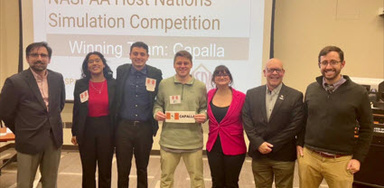Joshua Squires, first-year public affairs graduate student, recently competed in a regional 2024 Simulation Competition sponsored by Network of Schools of Public Policy, Affairs, and Administration (NASPAA) and was on the winning team. The competition offers public affairs students nationwide the opportunity to apply theory from coursework to simulated real-world situations, including international ones. Winners of the 13 regional competitions will be considered for the global competition prize.

This year’s topic was Host Nations and focused on policies and actions centered around a refugee crisis among four countries. Each team consisted of 4-5 members from a variety of U.S. and international universities who were tasked with finding the best solution to the issue during the eight-hour competition. Team members were randomly assigned to their roles and the fictional country they represented. Judges based the scoring on (1) adherence to the Human Rights Index, (2) percent of refugees that gained employment, (3) GDP change over baseline, (4) budget management and how close the spending came to full use of available funds without a deficit, (5) Debt Ceiling percentage, and (6) Equity Index.
Josh says Professor Sam Zuhlke’s graduate course in Public Policy Process in the School of Planning and Public Affairs was very valuable in the competition. Having learned the skills of writing successful policy memos was a key aspect in the judging. Additionally, his UI bachelor’s degree in analytic economics gave a strong advantage to his team, allowing him to understand ways to increase GDP and to enact wage subsidies, and work with game theory to better position his country.
Josh was assigned the role of delegate to represent his country, communicate with other countries, and advocate and negotiate for funding for his country. He was overseen by the simulated prime minister. Josh approached the role by forming policies used in leveraging economic interests of other countries, in the form of sanctions, to persuade them to open their borders to immigrants as well. Additionally, his team threatened to close their own borders which would put financial stress on other countries in the region and force them to enact policies his country desired. An additional key strategy was to forge good relations with other countries and make group decisions with them but to keep his own country’s best interests in mind.
The simulation covered a five-year time period. His country enacted policies that offered progressive relief and welcomed refugees for the first four years. During that time, his team’s country took in the most refugees, from 50,000 in the first year to 878,000 in the fourth. Without going into significant debt, they could not remain with open borders during the fifth year and were the only team to not exceed their budget in any of the years.
The policies his team enacted included offering (1) wage subsidies, (2) housing assistance, (3) full healthcare, (4) language training, and (5) vocational training. An additional policy that set his team apart was offering refugees $1,000 for start-up grant for new refugee businesses, which increased the country’s GDP. They additionally increased the number of employees in their asylum-seeking office to handle the influx and set a policy to accept 90% of applicants. Policies related to the Human Rights Index (HRI) were also significant in their plan. These included offering refugees buses to other countries if the immigrants preferred to live elsewhere, offering cash to assist refugees in returning to their home after the conflict, allowing citizenship after six years, and allowing refugees to move openly within the country. Other countries in the region chose policies based on detaining refugees which brought down their HRI. Furthermore, Josh and his teammates had to be mindful of political stability in the regional countries and how citizens would react to policies that were set.
Congratulations to Josh and his team and we wish them success at the global competition level! The next step will be judging of the 13 regional winning teams to select a global winner. Judges will review a recording of the regional team’s presentation, their policy memo, and look at the results of their decisions, policies, and successes.